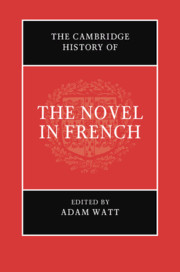Book contents
- The Cambridge History of the Novel in French
- The Cambridge History of the Novel in French
- Copyright page
- Contents
- Figures
- Contributors
- Acknowledgements
- Note on Conventions
- Chronology
- Introduction
- Part I Beginnings: From the Late Medieval to Madame de Lafayette
- Part II The Eighteenth Century: Learning, Letters, Libertinage
- 7 The Early French Novel and the Circum-Atlantic
- 8 Anglo-French Relations and the Novel in the Eighteenth Century
- 9 The Fiction of Diderot and Rousseau
- 10 The Memoir Novel
- 11 Epistolary Fiction: The Novel in the Postal Age
- 12 The Libertine Novel
- 13 Sade and the Novel
- Part III After the Revolution: The Novel in the Long Nineteenth Century
- Part IV From Naturalism to the Nouveau Roman
- Part V Fictions of the Fifth Republic: From de Gaulle to the Internet Age
- Index
- References
9 - The Fiction of Diderot and Rousseau
from Part II - The Eighteenth Century: Learning, Letters, Libertinage
Published online by Cambridge University Press: 04 February 2021
- The Cambridge History of the Novel in French
- The Cambridge History of the Novel in French
- Copyright page
- Contents
- Figures
- Contributors
- Acknowledgements
- Note on Conventions
- Chronology
- Introduction
- Part I Beginnings: From the Late Medieval to Madame de Lafayette
- Part II The Eighteenth Century: Learning, Letters, Libertinage
- 7 The Early French Novel and the Circum-Atlantic
- 8 Anglo-French Relations and the Novel in the Eighteenth Century
- 9 The Fiction of Diderot and Rousseau
- 10 The Memoir Novel
- 11 Epistolary Fiction: The Novel in the Postal Age
- 12 The Libertine Novel
- 13 Sade and the Novel
- Part III After the Revolution: The Novel in the Long Nineteenth Century
- Part IV From Naturalism to the Nouveau Roman
- Part V Fictions of the Fifth Republic: From de Gaulle to the Internet Age
- Index
- References
Summary
Diderot and Rousseau were friends and then enemies, and they were also both major writers of the Enlightenment. They argued that human nature should be understood and valued, and they argued against anything that constrained it, as they considered that all suffering was destructive. Fiction was part of their argumentative arsenal, and perhaps even the tool they felt was most effective, as it works through the imagination on the emotions. 'Natural' reactions of dismay or distress at injustice or cruelty could 'enlighten' the reader at an emotional and therefore natural level, and create new ways of seeing that rejected harsh convention and promoted natural morality. This chapter tracks these aspects through their fictional and non-fictional works, showing how central they are to all their writing. We also look at the friendship of these two writers, and at the publication history of their fictional work.
Keywords
- Type
- Chapter
- Information
- The Cambridge History of the Novel in French , pp. 170 - 186Publisher: Cambridge University PressPrint publication year: 2021

